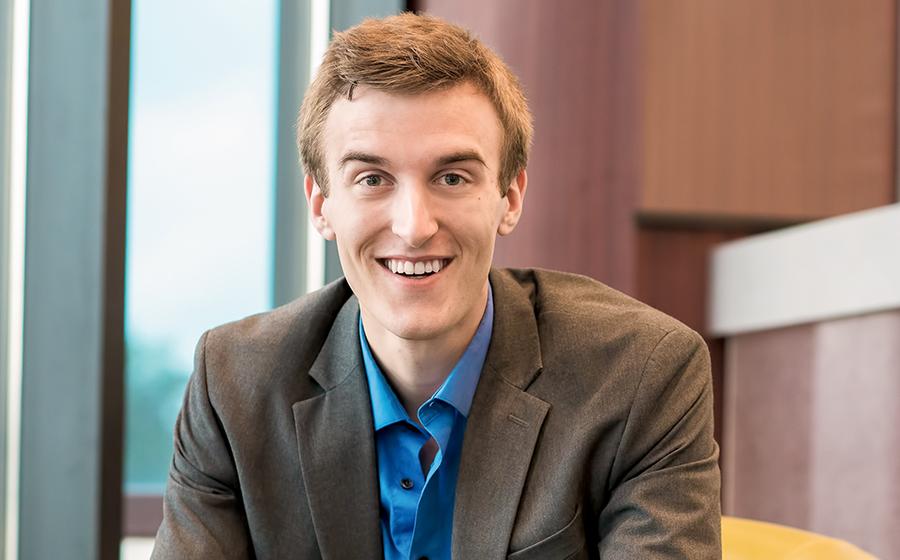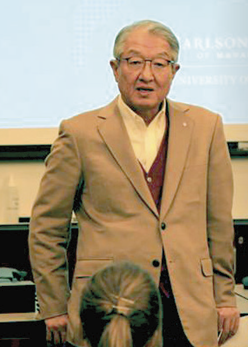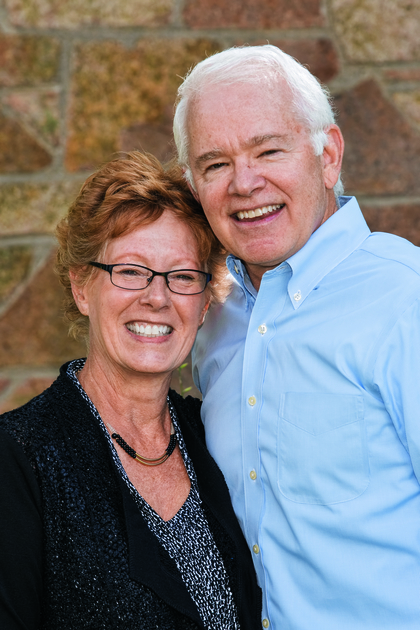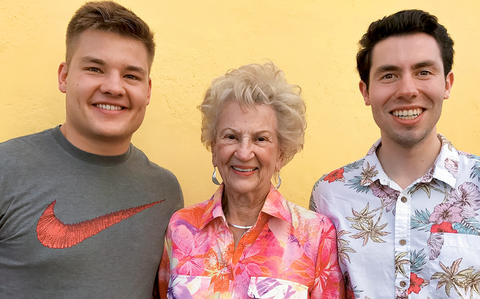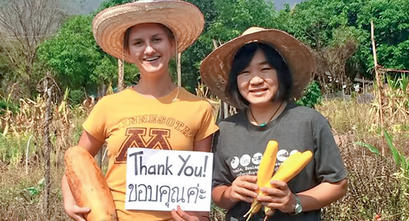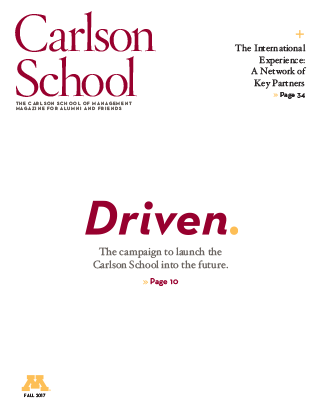
A Force for Transformation
Tuesday, November 14, 2017
Students entering the workforce need to bring with them real-world experiences, time spent beyond the classroom applying their intellectual capacities in a hands-on way. Today's business environment demands it. Experiential learning programs bring critical thinking skills to bear while solving real problems for real businesses and education abroad programs develop students competencies, all while working cross-culturally.
Social Venturing in Action. Literally.
For the last five years, Strategic Management and Entrepreneurship Senior Lecturer Steve Spruth has been emphasizing the “in action” part of his MGMT 4000 course, Social Venturing in Action. The undergraduate class is designed to be similar to the hands-on approach MBAs receive in their Enterprise courses.
The genesis of the class began about 10 years ago when a group of students wanted and helped create a nonprofit major at the Carlson School. “The capstone was this class, where you can study how local nonprofits can try to solve the world’s problems,” says Spruth, who team-teaches the class with Venture Enterprise Director Toby Nord. “But some of the most interesting social projects were not in nonprofits, they were in for profits. This last year we got permission to broaden this capstone class to look at what social entrepreneurs are doing to make the world a better place.”
Now, half the class does consulting projects with nonprofits and half are working with for-profit companies. “They are doing amazing work and amazing projects,” Spruth says.
One example is Sunrise Banks. “It’s a public benefit corporation, which means it is written into its legal charter that it is not only producing profits, but also achieving good social results,” Spruth says. The assignment was to look for a nontraditional way to provide banking service in North Minneapolis. Spruth found out about the bank’s need from his teaching assistant, Adam Rao, who was about to take a job there.
“Most of the residents in the area rely on payday lenders, check cashers, and alternative financial services for day-to-day living,” says Rao, ’17 MBA and now senior associate of corporate strategy and innovation at Sunrise Banks. “So we had the students work on the voice of the customer in North Minneapolis and other financial deserts in the U.S. and see what banks and other financial institutions have been doing to resolve those.” The students then made a presentation of the trends and pain points they discovered to the bank advisory board. “We’ve been chewing on that information ever since,” Rao says.
If you are interested in what drives social performance and financial importance, Rao says, you have to get out there and do it. And the opportunity to do it is pretty rare—for undergraduate students. “They had a chance to interact. That’s the fundamental change,” he says. “These folks were working on real projects in the real world with financial and community impacts. We take the work that they did seriously.”
The class also worked with Wilderness Inquiry, a nonprofit and the nation’s largest provider of canoe based education. “We are designing an activity where Carlson School students will canoe down the Mississippi River this fall learning about water-related projects past, present, and future,” Spruth says. Wilderness Inquiry, with an office in Dinkytown, is founded and directed by Greg Lais, ’91 MBA. “Steve was thinking how he could weave this river experience in more of an academic way,” he says. “We talked about all of the pieces in terms of business development. St. Anthony Falls, the founding of the milling industry, river transportation, waterworks system—so many of our things started here in the community because of the river.”
The class will spend two-and-a-half days paddling the river in 24-foot canoes and visiting sites from a water intake plant in Fridley—which serves most of Minneapolis and St. Paul—to a waste treatment plant in Cottage
Grove. Along the way, students will observe all the businesses that have evolved on the river bank as well as the native life—otters, eagles, and blue herons—that make the river their home.
“A lot of people may think that it’s environmental education. Certainly there is a lot to learn there, but it’s not environmental education per se,” Lais says. “The class is really about experiencing the Twin Cities in terms of business and infrastructure through the experience of the Mississippi River. Discovering how the natural environment and natural resources helped to shape the creation of the Twin Cities and how the two interact even to this day. Ecology, commerce, and business rolled into one.
Entrepreneur Returns His Scholarships—In a Sense
Tyler Ebert, ’16 BSB, is fresh out of school, but is already giving back. He received two scholarships while attending the Carlson School and has since donated equivalent amounts back to the University.
“I appreciated the school making an investment in me,” he says. “When I found out about the campaign I wanted to be a part of it. I got to a position a couple of months ago when I could start giving back and I decided to give back the scholarship amount I had been given. And I want to keep doing it. I want to make that my plan.”
The first scholarship he received was early in his sophomore year. Then, as a junior, he received his second—the Student Entrepreneur of the Year Award. “Talk about one of the most memorable nights of my life,” he says. It was Founder’s Day, an annual event that celebrates student entrepreneurs. The Holmes Center for Entrepreneurship Director John Stavig asked Ebert to attend, so he went, not knowing what was about to happen. “I stepped out to talk to someone and when I came back, John was talking about the award and was describing the person who won it. Then I realized he is talking about me! I hate to think I almost missed it!”
The award came with a cash prize, and Ebert put it all into the business he founded and now serves as president and CEO: AdrenaCard. AdrenaCard is a specialty pharmaceutical company taking generic drugs and combining them with devices to make them more effective and more affordable. The company is creating an epinephrine injector about the size of a credit card—which makes it easier to carry and have on hand in an emergency.
Ebert actually created three businesses before he founded AdrenaCard. One of them was an idea to sell disposable beer kegs. Ebert worked on the project through the Holmes Center’s STARTUP program, an independent study class that pairs students with experienced entrepreneurs to test and develop business concepts. The beer keg idea turned out to be a nonstarter, so Ebert moved on to another project, which turned into AdrenaCard.
“It started my junior year in my dorm of all places, as is the cliché,” he says. He took AdrenaCard to the Holmes Center’s Biz Pitch Competition, an “elevator pitch” contest that offers prizes for the most compelling new business idea. “We won not only first place, but the people’s choice award,” he says. “We won $1,100 and were able to start the company.”
Now with a medical-based company in hand, Ebert found himself drawn toward the Medical Industry Leadership Institute (MILI) and took classes on regulatory pathways for devices and drugs and an introduction to quality systems. “There were MBA students from Medtronic and I was picking their brains learning about medical device regulation,” he says. Ebert also engaged MILI’s Medical Industry Valuation Lab, which provides expert opinions on the feasibility of medical innovations developed by students.
“The entrepreneurship program connected me to all the great resources in the U, the community, and the state,” he says. “The fact that there are resources in other departments—you don’t get that in other universities.”
Now doing business in three states, AdrenaCard looks to be on the road to great success. Ebert says he knows people who have been successful reading a book a day, but that’s not the educational path he chose. For him, the transformative nature of his Carlson School education made the difference.
“I’m very pleased to have graduated with a job at a company I created,” he says. “I went into senior year thinking I was going to make it happen and I worked the entire year to make it happen. Building companies, creating jobs, and bringing money to the state of Minnesota is my story. I’m proud the U of M was, and is, a part of it.”
Tackling International HR Issues Head-On
This fall marks the fifth year of the Carlson International HR Case Competition (CIHRCom). Case competitions have traditionally been a showcase for students to demonstrate their talents in a rather rigorous setting—developing solutions to real-world problems in a narrow timeframe and presenting them to industry experts.
CIHRCom owes much of its existence to one alum. Michael Byungnam Lee, ’88 PhD-IR, believed so strongly about the value of the competition in furthering the growth and development of global HR management issues that he provided $5,000 in seed money to launch the first competition five years ago.
“I thought it was an excellent idea to upgrade the learning experiences of HR students around the world,” he says. “The University of Minnesota is one of the pioneers in the field of industrial relations and human resource management and it has a long history of academic excellence and practitioner education. I thought it was critical that HR managers and executives have the understanding of the nature of international business and HRIR to become effective professionals.”
After graduating from the Carlson School, Lee worked in academia for a while in the U.S. before moving to Korea in 1995 to join LG Group, then the second-largest business conglomerate in the country. For 21 years, he worked in human resource management, labor relations, corporate education, and corporate governance transformation. He was serving as president before retiring a year and a half ago. He currently is a visiting professor at Sogang University and is on the board of directors of the KB Financial Group, Inc., the largest financial group in Korea.
Not only did Lee donate his personal money to help launch CIHRCom, he got LG involved as well, providing financial support. In 2014 and 2015, LG was the lead sponsor of the event and provided the case that the teams worked to solve. Last year, the company was a $5,000 partner sponsor.
It’s obvious that the best way to learn about international HRIR issues is dealing with actual, real-life business cases. What’s also invaluable, Lee says, is how CIHRCom gives HRIR students from around the world the opportunity to share experiences and perspectives. “The Carlson School has provided the venue for this and I am very glad and feel honored to get involved in this effort,” he says.
"Why we give."
When John Whaley received his undergraduate degree in accounting at the U in 1974, all his classes were held in the same building. Now, entrepreneurship programs at the Holmes Center he has championed extend to the broader University community, and he couldn’t be happier.
Whaley, a retired partner with Norwest Equity Partners, established the Whaley Foundation with his wife, Annette and their three daughters. One of the foundation’s major philanthropic goals has been in education.
The couple wanted to fund the academic side of the U, so they met with Holmes Center Director John Stavig and learned about the center’s development of a startup business curriculum.
“They had something that they were calling the Business Hatchery to help develop the right curriculum for startup business classes,” Whaley says. “We found that to be very intriguing and we gave funding which resulted in a formal establishment of the STARTUP course.”
Although the startup class was a mix of graduate and undergraduate students, Whaley thought it also would be great for students in the computer science and engineering schools, the medical school, or really every branch in the University.
“As we were talking along these lines, the opportunity to fund MIN-Corps came about,” Whaley says. MIN-Corps is a joint initiative between the Holmes Center, the College of Science and Engineering, and the Office for Technology Commercialization. Its goal is to increase research-based technology commercialization capabilities and activities throughout the entire University, exactly what Whaley was looking for.
“We’ve always thought that it is important for these kinds of skills to be developed at the University because there’s a big need for Minnesota to develop new businesses. We have to learn how to develop and grow the new Target, the new Cargill, the new 3M,” Whaley says.
Learn more or considering giving to the Carlson School Driven Campaign.
The positive experiences Bob and Karin Moe, ’56 BSB, had traveling overseas both for business and with their family directly inspired them to support Carlson School students in their study abroad efforts.
“When our children were at home, we started taking them abroad and I thought it was a very maturing experience,” Karin Moe says. “Now our grandchildren are going abroad in their college programs. It makes them interested in the world and I think it’s a very enriching part of their life.”
To assist undergraduate students in fulfilling their education abroad curricular requirement, the Moes established the Robert and Karin Moe Study Abroad Scholarship. This scholarship awards $500 to $5,000 toward students’ expenses overseas.
So far, nearly 90 students have received Moe scholarships for their international experiences and many more will be awarded within the next year.
Last March, Karin was asked to accompany an entrepreneurship class traveling to Cuba. “I was thrilled when they asked me to go along with them,” she says. “Two of the Moe Scholars were on the program and we spent a lot of meals together and I really got to know them, their backgrounds, and their goals. It was really nice.”
Moe spent nine days in Cuba. “It was fascinating to see the kids really get immersed in the culture and in the challenge of that particular atmosphere,” she says. “You could see how the kids benefit from it. I think this is a really great program for these young people.”
She remembers talking to one student who said the experience reminded her of ‘poverty without misery.’ “That’s a good way to look at it,” Moe says. “I’m sure the kids understand the challenge of doing business in other countries and their differences from one another.”
This is one of the reasons Moe finds the international requirement essential for students. “I can’t help but think they will look back and realize how it helped them grow as a person,” she says. “If you can have a broader perspective about things, you’re just going to be more successful and have more confidence.”
Acquiring Business Skills in Thailand
Most students say that their most transformative experience in school was in an international studies program. To emphasize this importance, the Carlson School was one of the first to make an international experience a requirement.
There are many ways to fulfill this requirement, including taking part in the Minnesota Studies in International Development (MSID) program offered through the U’s Learning Abroad Center. MSID brings students together with people from Africa, Asia, and Latin America to examine local and global problems with a particular emphasis on development issues.
Catlyn Christie is a double major in public/nonprofit management and HRIR with a minor in sustainability studies, concentrating on food systems. Her goal is to be an innovator within the public sector and devise creative solutions that address the systemic, root causes of issues.
She chose the MSID Thailand program for her international experience. For the first six weeks, she attended classes taught by Thai professors and went on field trips to various organizations and NGOs devoted to environmental sustainability, public health, and social services.
“The second half of the program was the internship phase, where we worked with an organization that matched our interests,” Christie says. “I spent my six weeks in a rural agricultural village an hour south of Chiang Mai, where I enjoyed staying with a family who taught me all about the lifestyle and operations of organic farming.”
Christie says it’s one thing to read about the rural agricultural villages of Thailand in a textbook, but it’s an entirely different experience to get to know and work alongside the individual farmers themselves. “I got a taste of what it’s like to be an organic farmer in the 21st century in Thailand, which is an experience that will resonate for a lifetime,” she says. She might not have had this experience without receiving a $3,000 Freshman Study Abroad scholarship.
“The scholarship was a key factor in determining what sort of program I could afford, short-term versus full-semester,” she says. “While both have incredible benefits, I am eternally grateful to have had a full five months in Thailand to adapt to the culture, learn about a wide range of complex issues, and build strong relationships with locals and my host family.”
Christie can quickly rattle off her career skills that have been enhanced through this program— intercultural competency, adaptability, problem solving, etc. “However, the greater takeaway for me is a newfound awareness and prioritization of listening and participation,” she says. “This program has taught me how to think critically about complex issues and always strive to elevate the voices of all impacted stakeholders, not just the loudest.”
She says that, as a leader, one must develop solutions to appease a variety of problems and pressures. “However, without involving those most impacted in the process of developing a solution, it stands little chance of being implemented and achieving its goal,” she says, adding that prioritizing inclusion in problem solving can develop solutions that people are excited to implement. “In all my future career endeavors, I intend to be a champion of this approach to making improvements,” she says.
